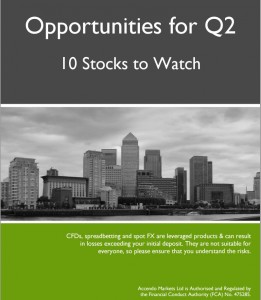This report is not a personal recommendation and does not take into account your personal circumstances or appetite for risk.
By Augustin Eden, Research Analyst
We hear a lot of chat in the run up to a general election regarding the stock markets – ‘uncertainty’ this and ‘headwinds’ that. One thing’s for sure, analysts and journalists love the chance for a good old bit of bearish banter every 5 years when the politicians have it out. But is there anything in it bar scaremongering and easy fulfillment of the media’s insatiable appetite for drama?
Does public sentiment get priced in to the markets? Sure. George Osborne engaged in a bit of bank bashing (unusually for a Tory, but he does have an election to fight…) in his pre-election budget speech, looking to the financial sector to fill the void left by sweeping tax cuts. This was an easy, populist ploy to garner votes from a disgruntled and impressionable public and will have an effect on banking shares, which will have an effect on the market as a whole. So public sentiment is a driver that moves markets.
but he does have an election to fight…) in his pre-election budget speech, looking to the financial sector to fill the void left by sweeping tax cuts. This was an easy, populist ploy to garner votes from a disgruntled and impressionable public and will have an effect on banking shares, which will have an effect on the market as a whole. So public sentiment is a driver that moves markets.
With the budget being somewhat of a Tory election pledge, the content therein was typical of a political party hunting for votes. Radical policy decisions such as a petroleum revenue tax cut for oil companies (which may impact energy bills), a £3.5bn tax bill for the naughty banks and a cut in alcohol duty are what move markets, sending those who stand to benefit one way and those who don’t the other. On the one hand the public will benefit, while on the other the banks will be less than happy, and less rich to boot. Prospect Theory has it that those who lose out will be more peeved than those who gain will be pleased, and so this leaves us with a net bearish outlook for the market as a whole.
The thing is though, that’s not what’s in store for the UK. I’m pretty certain we’re due another hung parliament and resultant coalition, and if there’s one thing coalitions are, it’s bullish. Political parties disagree, and you try passing a bill in cahoots with someone who disagrees with you. It’s not going to happen. No bank bashing, no mansion tax, no tax breaks for oil majors. Equity markets revel in balanced coalition-led economies, because companies get largely left to go about business unhindered with no winners and no losers, just bulls.
In voting for a hung parliament the British public will be unknowingly voting for a healthy stock market, but what do they actually think? I recently saw a cousin of mine at a party and mentioned I’d got a job in the city. She commented tactfully ‘oh no, not the ghastly stock market…’ We’d previously been discussing the merits of having a coalition government when the only thing that’s really gotten done has been the making of all-time highs by the UK 100 . Ah hell, the British public loves the stock market.
This research is produced by Accendo Markets Limited. Research produced and disseminated by Accendo Markets is classified as non-independent research, and is therefore a marketing communication. This investment research has not been prepared in accordance with legal requirements designed to promote its independence and it is not subject to the prohibition on dealing ahead of the dissemination of investment research. This research does not constitute a personal recommendation or offer to enter into a transaction or an investment, and is produced and distributed for information purposes only.
Accendo Markets considers opinions and information contained within the research to be valid when published, and gives no warranty as to the investments referred to in this material. The income from the investments referred to may go down as well as up, and investors may realise losses on investments. The past performance of a particular investment is not necessarily a guide to its future performance. Prepared by Michael van Dulken, Head of Research
Comments are closed.